He’s a triple threat! He’s won Tony awards for writing the book, score, and lyrics for his Tony award-winning Best Musical The Mystery of Edwin Drood, not to mention Tony nominations for the musical Curtains and his play Say Goodnight, Gracie. Now he has given Landless Theatre Company his blessing to create a symphonic/metal arrangement of his score. I asked Rupert Holmes about his journey of writing Edwin Drood and his upcoming visit to the Arts Barn in Gaithersburg, MD this Sunday, September 18th, where he will be attending Landless Theatre Company’s new Symphonic/Metal production, and where he will be leading a post-performance discussion.
Joel: When did Andrew Baughman of Landless Theatre Company first approach you about doing a symphonic/metal version of The Mystery of Edwin Drood? What were your first reactions and why did you agree to let him do it?
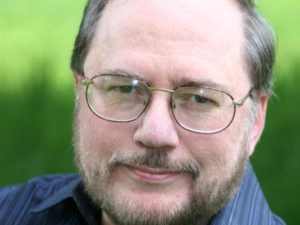
Rupert: It was about two years ago, and my reaction was of much interest and curiosity. Upon consideration, and particularly after talking with Andrew, I thought Edwin Drood might take well to a heavy metal treatment and, as a musical whose ending is constantly changing, this interesting change of scenery for the show would be a fascinating experiment.
I hear you are coming to see the show this weekend. What are you most looking forward to seeing and hearing when you come to see Edwin Drood?
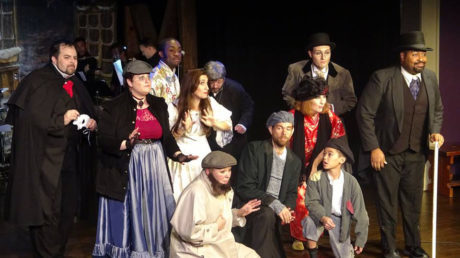
I will indeed be seeing the show, and participating in a Q&A afterward, this Sunday, September 18, 2016. I most look forward to seeing how the show’s trademark interactivity with the audience is influenced by this heavy metal treatment. Will it bring out the best or the beast in the audience, meaning will they pick happy or outlandish endings…and will the darker characters win out…or will the goodhearted and romantic souls triumph? I’m also particularly looking forward to seeing how this engaging and daring cast makes the roles their own.
Have you ever granted permission before to a theater company to create new arrangements? Are there other styles of music that you think would fit your score for Edwin Drood?
All previous productions have keyed out of my own original orchestrations for the first Broadway version or my re-orchestration of the recent Roundabout revival. Of course, talented musical directors are always finding ways for my orchestrations to fit their own particular ensemble, so there have been adaptations, but never of this nature or on this scale.
Have you heard any of the new Landless arrangements and if so, which ones are your favorites? Have you made changes or made suggestions regarding the new arrangements? Did Andrew sent you the arrangements for your approval as they were written?
https://www.youtube.com/watch?v=fvm2kOGjklQ
I made a few tentative suggestions and Andrew has run the arrangements by me, but as a character in Edwin Drood exclaims, “In for a penny, in for a pound!” so I have let Andrew and his team have their way with the score.
How would you describe your score for The Mystery of Edwin Drood?
The show is set in 1895 England, so I wrote it as if I’d been teleported back in time and had to write a score acceptable to that period while still knowing what I do about Rodgers and Hammerstein, Puccini, Hitchcock film composer Bernard Herrmann, and other composer idols of mine. Obviously the score owes a lot to the style of Gilbert and Sullivan, to British music hall songs, and to singer-songwriter Rupert Holmes. I always forget to acknowledge him.
Take our readers on the journey of writing Edwin Drood-the score, lyrics, and book and a little history of the Broadway productions. How much were you involved in the recent revival on Broadway? How did you like it?
When I read Charles Dickens’ tantalizingly-unfinished last novel, it struck me that it might make for a fascinating musical. Its protagonist is a crazed choirmaster who sings and plays the organ superbly. He’s madly in love with his music pupil, the fair young Rosa Bud. The choirmaster also frequents a sordid opium den where he hears the music of the spheres. Other characters sing these odd street songs. All solid stuff for a gripping musical. But Dickens died halfway through writing the book and left no notes as to how it should end. I thought, “How would I ever have the audacity to complete this work?” But then I thought, “But how wonderfully theatrical it would be if the audience could help decide the ending at each performance being unique.” If I could write it in a labyrinthian way, the audience could vote on several key questions and see different combinations of confessions, revelations, and romances . If they went to the show six nights in a row, they could see any of five detectives in disguise, eight different murderers confessing with thirty-six different combinations of lovers singing in the happy ending.
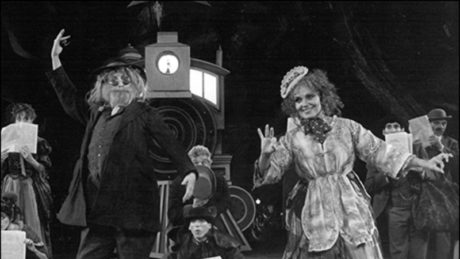
Joe Papp and his wonderful wife Gail Merrifield knew my work as a songwriter, with particular emphasis on my story songs, and they asked me if I had any ideas for a musical. I shared my vision for Edwin Drood and they were intrigued. “Who would write the book?” which means the script for the musical minus the songs. They asked, and I said, well, I will of course. I’d been steeped in theatre all my life, especially British theatre, and I pointed that if I’d been telling tons of complete stories, often with trick endings, in three and a half minutes for the past decade that all had to rhyme, then maybe writing a script that didn’t have to rhyme and had two hours to tell its story might be…liberating!
My first draft of Edwin Drood ran about three and a half hours. I immediately volunteered to cut a song. Over the next few months, with the help of my wonderful director Wilford Leach and the equally amazing choreographer Graciela Daniele, I was able to bring it down to a manageable length, and so there are songs we lost that never came back, titles like “Evensong” and an homage to drink called “I Wouldn’t Say No” and “When Shall These Three Meet Again?” although little fragments of them are still heard in the underscore.
We first performed the show at the Delacorte Theatre in New York’s Central Park, where they do Free Shakespeare each summer. That summer, I got to be Shakespeare. It was a huge hit there, with people camping out in the park at dawn to get tickets for sunset. We moved to Broadway that same year and it won the Tony Award for Best Musical, and I received Tony Awards for Best Book, and Music and Lyrics.
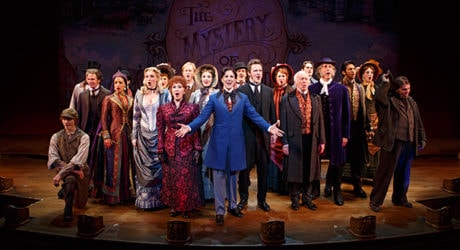
I was as closely involved with the recent Roundabout Broadway revival as I was with the original production. Its director Scott Ellis and I first worked together on the Kander-Ebb-Holmes musical Curtains and I have great affection and unbounded admiration for him…plus he’s huge fun to work with. He did a brilliant job directing the revival, for which I rewrote some songs and scenes, new jokes, sight gags and even some Murderer’s Confessions. In addition, I had to re-orchestrate the entire show and its many endings all over again, because the size of a Broadway orchestra is considerably smaller these days.
I loved and cherished the revival. I never thought I’d be able to have a cast as wonderful as the original production, but Scott brought together an amazing troupe of brilliant and inventive actors, as he always does, and the end result felt as bright and new as ever. Because it is set in a Victorian era, with a Music Hall company of my own invention, the show never felt like a revival of ‘an Eighties show”…unless you mean the Eighteen-eighties. The wonderful thing about setting a musical in a distant, timeless (and somewhat make-believe) world is that it doesn’t grow old or dated.
What does The Mystery of Edwin Drood have to say to modern audiences? How can they relate to the show?
Despite its ground-breaking interactivity, and its Dickensian and Music Hall trappings, Edwin Drood is very much a show about putting on a show…as is true of so much of my work, whether it’s the characters of the musical Curtains, Accomplice, or the AMC TV series Remember WENN. For in addition to solving Mr. Dickens’ unfinished mystery at each performance, it is a musical about the members of The Music Hall Royale and their valiant attempt to extend themselves beyond their resources and go where no theatrical troupe has gone before. I find that high schools and colleges who put on Edwin Drood tell me it is among their fondest experiences in musical theatre, and I suspect that this is because the show is really about them. In Drood, every member of the cast has a Victorian character to play and speeches to make to the audience.
And it’s also the quintessence of that special collaboration that takes place between actors and audiences at every play, the effect that the audience’s expectations and response has on every performance…except that in Edwin Drood this is heightened to the extreme and built into the very structure of the show. For contemporary audiences it is also very much a show about being an audience and understanding how you affect any performance both by your presence and your appreciation. Musicals often have opening numbers that declare in one way or another, “This is our moment, you’re going to hear great things from us, we’ve got nothing to hit but the heights, look at us!” Edwin Drood‘s opening number is “There You Are!” in acknowledgement of the audience’s presence and how grateful the performers are that the audience has deigned to show up this evening.
And by the manner in which they vote, the audiences at Edwin Drood also have the chance to express how collectively kind-hearted, mischievous, wicked, or silly they are. So it’s a show about actors putting on a show about the vital role the audience plays in that process.
We are seeing more productions of the show. Why do you think it is appearing on more stages now?
Well, it has been building an audience for some thirty years now. A lot of directors are picking it because they were in a production themselves when they were younger, and they have special feelings for the spirit of the show, and wish to create that again for a new cast. And although Drood’s score flourishes best within the show–I intentionally did not try to write any stand-alone pop hits for the show, even though my background had been pop music–some songs from its score have become established theatrical “standards” by now: “Moonfall” is in many sopranos audition books, “Perfect Strangers,” “A Man Could Go Quite Mad,” “Don’t Quit While You’re Ahead” and the tongue-twister “Both Sides of the Coin” are showy numbers that crop up on Sirius and other streaming “Musical Theatre Channels.” And of course the Roundabout revival introduced the show to a lot of devoted theatre-goers who missed it the first time around.
What are you working on now? Will we see another musical from you in the future?
I’m working on a new play (a non-musical) called Kennedy/Reagan which we’re doing a reading of in New York this month, a musical I wrote with Melissa Manchester and Sharon Vaughn that was a big hit in Houston this year called Sweet Potato Queens, another musical I wrote with Alan Zachary and Michael Weiner called Secondhand Lions that we recently did at the Fifth Avenue Theatre in Seattle, my Nutty Professor musical that I wrote with my deeply-missed ally Marvin Hamlisch, and my own solely-created musical of The Picture of Dorian Grey.
And I’m currently working on the book of a wonderful property about the 1955 Dodgers baseball team, entitled The Boys of Summer, and another awesome subject: the life and work of Andy Warhol. So yes, you should be seeing more than one new musical from me in the future.
You have had your work produced in The DC area.
Solitary Confinement set a new box office record at the Eisenhower Theater at The Kennedy Center. The Mystery of Edwin Drood was at The Kennedy Center Opera House, and I first raised A Time To Kill at Arena Stage a few years back.
There was also a nifty theater company called the Elden Street Players in Herndon that did first-rate productions of my non-musical comedy thrillers Accomplice and Thumbs. I think they may have evolved into a different company in recent years. Do you know of them?
Yes I do. They have evolved into a professional theatre company called NextStop Theatre Company, and they continue to produce outstanding work.
Which young composers working in the theatre today do you admire and who reminds you of yourself? What advice would you give them? And what advice would you give a student who is considering becoming a composer for the stage?
No one reminds me of myself as much as Marvin Hamlisch did. We could talk telepathically, finishing each other’s sentences before we’d started them. I admire all the admirable new talent that’s out there, but I’m particularly impressed by the talents of the aforementioned Alan Zachary and Michael Weiner, who also wrote the Broadway musical First Date.
The advice I’d give anyone starting out is to find what is most unique about your voice and put emphasis on that, rather than trying to sound like Sondheim or any of the Sondheim clones that are out there. Be so true to yourself that if someone wants what you do, they can only go to you to get it. And what I’d say to anyone who is simply “considering” working in musical theatre (in whatever capacity that might be) is that if you aren’t compelled to do it, then perhaps you shouldn’t dabble in it, because there is so much heartbreak, pain, rejection and disappointment inherent in the profession that you need every bit of determination to have a hope of succeeding. You must be prepared to bash your head against a series of brick walls, have your feelings hurt, and have your talent questioned at every turn, and still be able to say at the end of each day, “Please sir, may I have more?”
Running Time: Two hours and 30 minutes, with a 15-minute intermission.
The Mystery of Edwin Drood plays through September 25, 2016, at Landless Theatre Company performing at The Arts Barn – 311 Kent Square Road, in Gaithersburg, MD. For tickets, call (301) 258-6394, or purchase them online.
LINKS:
A Report on Landless Theatre Company’s Symphonic Metal ‘The Mystery of Edwin Drood’ by Nicole Hertvik on DCMetroTheaterArts.
Andrew L. Baughman on Landless Theatre Company’s New ‘Symphonic Metal’ Version of ‘The Mystery of Edwin Drood’ Playing Through 9/25/16 at The Arts Barn by Joel Markowitz.



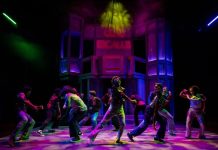


A recent book, Sheppton: The Myth, Miracle & Music, explores another of Rupert Holmes compositions, “Timothy” was a huge 1971 hit by the rock group The Buoys. The song seemed to connect the Sheppton mining disaster with elements of cannibalism. Learn more at shepptonmyth.com